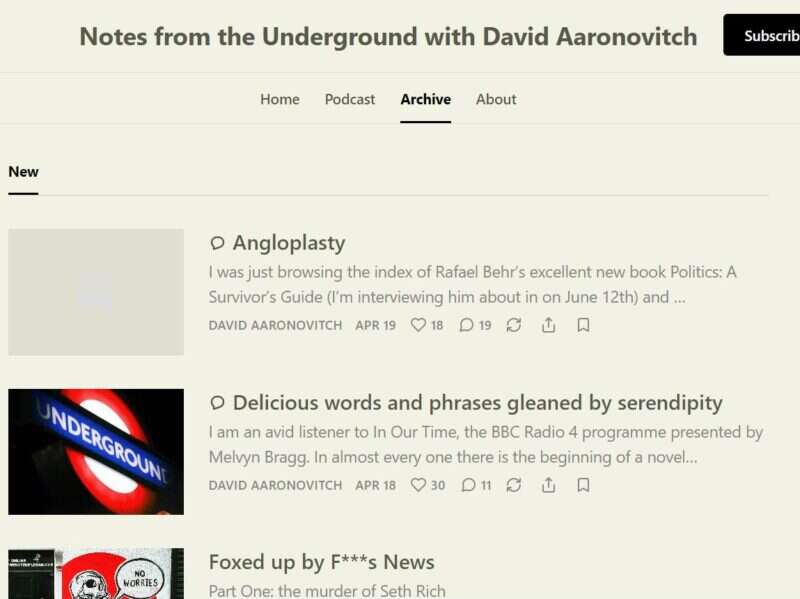
David Aaronovitch hates it when people leave an organisation after many years and go on to “bitch” about their old employer.
He makes clear during an interview with Press Gazette that he has no hard feelings towards The Times, where he wrote a weekly column for 18 years until he got fired in March. But he is a little miffed by the nature of his departure.
Speaking to Press Gazette’s Future of Media Explained podcast, Aaronovitch said he was disappointed to learn of his departure from HR rather than from new editor Tony Gallagher himself: “People have to do things in the way in which they want to, but it’s not the way I would choose to do it.”
He is philosophical, however, about the decision itself: “I never expected to get the Times job. It was a big surprise to me when I got it and was offered a job there. It was because Simon Jenkins had left and gone to The Guardian… I always thought ‘I’m going to have to be at the top of my game all the time because this is one of the best, best, best writing jobs in journalism and it’s not a right to have it’.
“And I feel that now. I didn’t have any right to that job, I’d done it for a long time and it is always true that incoming editors will look around them and say ‘here’s something I want to do differently or something I want to do better or I just don’t like the cut of that person’s jib and I’d rather not have to deal with it’.
“So that’s the first thing. And the second thing to say is that Times is a great, great, great newspaper with fantastic people working for it.”
Joining Substack when ‘all you’ve got is your past reputation’
Aaronovitch has quickly moved on to his own experiment: launching a Substack newsletter, Notes From The Underground, at the end of March. One of his newsletter’s main missions, he writes, is to “give readers the weapons necessary to debunk and sometimes even prebunk the worst and most insidious of the bogus claims and arguments widely disseminated in the modern world”.
He first got the idea after being introduced to Farrah Storr, a former editor of Elle and Cosmopolitan UK who is now head of writer partnerships for Substack in the UK.
At this point, Aaronovitch had subscribed to a few Substacks but not considered writing one himself. He found it “scary” as most of his career to date has been so structured around clear deadlines and expectations from editors.
One problem he has now, he says, is the “incredible cacophony” of writers with whom he must compete. “People have endless choices of who they’re going to read, who they’re going to follow and what they’re going to listen to, and so on. So what have you got to offer? I mean, if you’re in The Times, you’re in The Times, it’s already done. It’s a done deal. And all of a sudden that deal’s undone and anything that then happens, you’ve got to make happen and it’s not at all clear that you can.
“And you’ve got to choose everything. You’ve got to choose your length, you’ve got to choose your subject. You’ve got to try and work out what it is your readers, the readers, are likely to want. You’ve got to start a relationship with readers in a way you’ve never quite had before, and all you’ve really got is your past reputation…”
Indeed, he acknowledged that when he left The Times he was “probably about as well known as I’m ever going to be”.
What helped him get started was looking at “terrific” writers who were already on Substack. Aaronovitch singled out for praise Sam Freedman “who has suddenly gone from being a policy wonk to a really lucid commentator”, Joshua Rozenberg KC who he says is “wonderful for one-stop shops to try and understand what’s going on in the legal world”, and The Atlantic’s Helen Lewis who, he reveals, is the person he secretly wishes had replaced him at The Times as he describes her as “one of the most talented journalistic writers of our current generation”.
Aaronovitch is also enjoying his new freedom from word counts, from competing with other Times columnists over the same subject – and to write about former employer Rupert Murdoch’s empire. “…I’ll be saying it to many fewer people, but I can say it,” he says.
He has already written about Fox News’ $787.5m libel payout to Dominion and a previous settlement by the broadcaster with the parents of Seth Rich, a Democratic National Committee staffer about whom it aired false claims following his 2016 murder.

The newsletter has gained more than 6,000 free and paying subscribers in less than a month. Currently, Aaronovitch publishes most of his content for free but says, for now, he’s “just playing around with it” – though he already believes it is a “brilliant model” for managing subscriptions.
“The advice early in Substack is put your best stuff out for everybody at first, and then gradually build in some paid subscribers’ stuff only, and then gradually make that quite good too,” he explains. “But actually I am just mucking around with it. So Farrah showed me how to put a paywall into the Substack so that you read a bit of it, and then you hit the paywall. Now, I’m thinking about this because it’s quite a useful tool in some ways, but I don’t want to annoy my readers.”
‘A hell of a lot of fun’
Aaronovitch adds that it is a “very odd thing to be doing after quite a long institutional journalistic career” but that it is a “hell of a lot of fun” so far.
He is enjoying it so much that when asked whether he would recommend it to other writers and columnists, he compares it to “discovering a really nice holidaying place. Are you going to recommend it to everybody, so they all turn up? It’s really nice, it’s got all the amenities, et cetera, but it’s not overcrowded right now. You can still find, you know, plenty of room on the beach to have a swim. So are you going to write a great big piece saying everybody, you should get down to this beach because it is just fantastic…?”
He does think, however, it is not suited to everyone “because some people need the structure”.
Asked his thoughts on the current crop of newspaper columnists and comment sections, Aaronovitch gives a mixed verdict saying there are “some good writers out there” and “some truly terrible columnists getting column spaces in British national newspapers”.
“I mean, they can’t write, the stuff they write is stupid, it’s badly researched, but it conforms to the prejudices of their readers,” he says. “I think with one or two exceptions, for example, what’s in The Telegraph is just wall-to-wall rubbish, and it didn’t used to be. Whatever you thought of the politics of Telegraph columnists, say, 20 years ago there was a kind of respectability…”
He goes on to decry what he calls “plausible columnists” – or columnists who write columns where “at first sight, it seems to hang together but you ask yourself just one or two early questions into it and actually it’s just there’s nothing there”. Meanwhile, some columnists are “just stylists… it doesn’t really matter what they’re saying, whether what they’re saying is kind of quite often nonsense – they just write it so well…”
Columnists he rates include The Times’ Matthew Parris – “one of the last stylists really of that sort where he always just writes it so well that sometimes even when what he’s writing is more or less nonsense, it’s not often, but it’s just kind of fun”. He adds there are several “very good columnists who I disagree with” including Dominic Lawson in The Sunday Times, and also listed Janice Turner, Danny Finkelstein and William Hague who all write for The Times.
“But there are so many columnists – so many. People’s thirst for opinion is huge, and some of those opinions are on the cusp of not worth listening to.”
Hear more from David Aaronovitch, including his process for pitching and writing columns at The Times and more about the thinking behind his new Substack, on Press Gazette’s Future of Media Explained podcast.
Email pged@pressgazette.co.uk to point out mistakes, provide story tips or send in a letter for publication on our "Letters Page" blog
